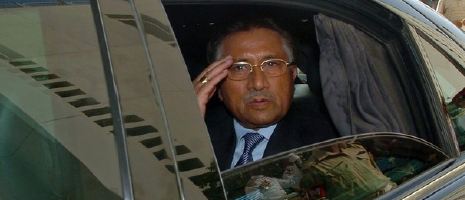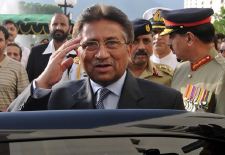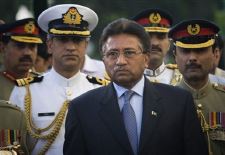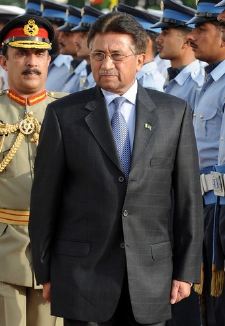Adil Najam
In a nationally televised speech, Gen. Pervez Musharraf, President of Pakistan, has just announced his resignation, pre-empting a move to impeach him by the parliament.
This post has been updated to add news photos from this momentous day in Pakistan’s political history. The pictures speak eloquently of the moods and thoughts of the day. (Scroll down to see the video of Gen. Musharraf’s resignation speech).
Participate in a poll on what might be Pakistan’s future post-Musharraf, here.
![]()
Here is a Pervez Musharraf time-line, published in The News:
August 1943: Born in Delhi, India
1964: Joins Pakistani army.
1998: Becomes army chief of staff.
October 1999: Seizes power in a bloodless military coup, overthrowing the prime minister, Nawaz Sharif. In response, the Commonwealth suspends Pakistan’s membership.
June 20 2001: Makes himself president, replacing Rafiq Tarar, while remaining head of the army. Tarar is forced out of office when the parliament that elected him is dissolved.
July 2001: Holds first meeting with the Indian prime minister, Atal Bihari Vajpayee, at Agra in India. No progress is made because of differences over the disputed territory of Kashmir.
September 2001: George Bush courts Musharraf, asking him to join him in his “war on terror” and help defeat the Taliban in neighbouring Afghanistan. The US president promises Pakistan $1bn in aid.
April 2002: Wins a referendum giving him another five years in office. Observers criticise the referendum as blighted by irregularities.
May 2002: Pakistan test fires three medium-range surface-to-surface missiles capable of carrying nuclear warheads. Musharraf insists his country would not be the one to initiate war.
August 2002: Consolidates his power still further, giving himself the right to dismiss an elected parliament.
October 2002: Pakistan’s first general election since Musharraf seized power in 1999 results in a hung parliament.
November 2002: Mir Zafarullah Jamali becomes the first civilian prime minister since 1999. He is a member of a Musharraf-supporting party.
November 2003: Pakistan’s National Assembly meets for the first time since 1999.
December 2003: Musharraf promises to step down as head of the army by January 2005.
May 2004: Pakistan is readmitted to the Commonwealth.
December 2004: Musharraf announces he will stay on as head of the army.
August 2005: Pakistan tests its first nuclear-capable cruise missile.
March 2007: Musharraf suspends the chief justice, Iftakar Mohammed Chaudhry, triggering a wave of anger across the country and the first joint protests held by the parties of exiled former prime ministers Benazir Bhutto and Nawaz Sharif.
October 2007: Signs a corruption amnesty, opening the way for Bhutto’s return and a possible power-sharing agreement. Within hours of Bhutto’s arrival back in the country, bombers attack a Bhutto rally in Karachi, killing more than 100 people.
November 2007: Declares a state of emergency, rounding up opposition leaders at gunpoint. In the same month, Musharraf quits as head of the army, becoming a civilian president.
December 15 2007: Lifts state of emergency and announces plans to go ahead with parliamentary elections scheduled for January 8.
December 27 2007: Benazir Bhutto is assassinated at an election rally in Rawalpindi.
January 2008: Elections postponed until February 18.
February 2008: The two main opposition parties gain a clear majority in the elections.
August 2008: The two main parties strike a deal to impeach Musharraf if parliament backs the move.
August 18 2008: Musharraf announces his resignation



























































This is D
Samurai Zauq > They will blame the next guys. And then the next and each time they leave, there will be dancing in the streets.
This has happened since as far back as I can remember.
Mushraaf should had resigned after the 18 Feb elections when his party was rejected by the people of Pakistan……….
Undoubtedly Musharraf has done various things for the betterment of Pakistan but it is wrong to saythat without Musharraf Pakistan would suffer………
Bombing our northern areas and Baluchistan, handing over Pakistani’s to US, playing with the judicaiary and the killing of innocent madressah students at lal Masjid brought the downfall of Mushrraf…..
I donot expect much from AZ and NS as they have been tested before but I hope that they have learnt fron their mistakes and would collectively work for the betterment of Pakistan…..
ALLAH HUMARA HAMI NASIR HOOO
Who are they going to blame for the ills of Pakistan now?
He should have resigned after Bugti, wrote his book and joined his son at Stanford. But that was not to be, he had to be dragged through mud. Still, it is good for him to resign and lead our nations in the hand of Zardari Tharki and Ganja Shareef. There is no escape from feudalism.
I hope this nation can remember the good with the bad, and accept his resignation with gratitude and thanks, but knowing our politicians, that will not happen. He took Pakistan into the 21st century.
Let’s see the Great PATRIOT of Pakistan decides to stay in his country or opts for a foreign land.
The so-called corrupt politician ZAB refused to leave his country and gave his life for the country.